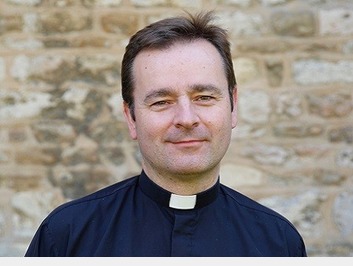| View this email online if it doesn't display correctly |
| |
|
|  |
Tuesday 11th July marks the feast of St Benedict of Nursia. Benedict lived at the beginning of the sixth century during a tumultuous and turbulent period of history in Western Europe. The Roman Empire was in decline. There was social unrest and political upheaval. During this period, he founded a number of monastic communities in the region of Umbria in Italy. One of his greatest achievements was to synthesize the experience of these communities in his Rule, which contains some profound wisdom about the character of living in a community: ‘What gave meaning and significance to the lives of the monks was the daily praise and worship of God. Around that every other activity revolved. Attention to God made them aware of their duties to their neighbour and their stewardship of his creation. They learned to cherish whatever was good, noble and beautiful’ (Cardinal Basil Hume OSB).
Although Henry VIII suppressed the monasteries at the Reformation, the Benedictine way of life has continued to exert some influence over the Anglican tradition - in the fact that many Cathedrals and Greater Churches were Benedictine foundations and retained a Benedictine flavour, in our shared pattern of daily prayer, and in the revival of religious communities in the Church of England in the nineteenth century.
One of the lesser known facts about Benedict is that he is also the patron saint of Europe. It is fair to say that following the referendum just twelve months ago our relationship with Europe and the European Union has become more ambiguous. Politicians and business leaders continue to argue over the merits of ‘hard Brexit’ or ‘soft Brexit’. Arguments are fierce. Disagreement and dissent is barely tolerated. There is little consensus.
St Benedict begins his Rule with the word ‘Listen’ and he impresses upon the Abbot, the leader of the community, the importance of listening and the importance of reaching a consensus within the community. Sometimes that means listening to the youngest members of the community first. As we face a period of political turbulence and unrest in our own time, perhaps we need political leaders to attend to St Benedict’s wisdom and his emphasis on humility. Perhaps a more consensual approach offers us a way of changing the character of our national conversation. Perhaps then our political leaders may begin to find a way forward.
Revd Dr William Lamb Vicar |
| | Services
—Monday - Friday at 9am Morning Prayer (Chancel)
Tuesdays & Thursdays at 12.15pm
Lunchtime Eucharist (Chancel) —
Sunday 9th July: Trinity 4 10.30am - Sung Eucharist
Preacher: The Revd Charlotte Bannister-Parker 5.00pm - Choral Evensong (Chancel)
|
| | | Choral Evensong
Sundays 5.00pm in the Chancel 9th July, 16th July
This Week Responses: Alyeward
Canticles: Gibbons, The Short Service
Anthem: Parsons, Ave Maria
|
| | | 23rd July: All-Age Service and Sunday School Picnic
There will be an all-age service on the 23rd July at 10.30am followed by the annual Sunday School picnic. Please bring along a picnic and something to share. This will be Claire's leaving service.
|
| | Forthcoming Concerts
—
Saturday, 8th July, 8pm : Oxford Sinfonia
David Crown conductor
Mahler symphony no 1
Mozart clarinet concerto
|
| | Mystery Plays
Sian Witherden (DPhil English, Balliol) and Penny Boxall (Education Officer, University Church), with the support of TORCH, have orchestrated the updating of 8 key plays from the York Mystery Cycle. The plays have been rewritten by local groups, standing in for the guilds of medieval York.
The plays will be presented in a staged reading on Saturday 29th July, performed by members of the local groups, at the University Church. The new mystery plays include writing by (among others) Bodleian Library Staff, Frideswide Voices, Brookes Creative Writing MA and Thames Valley Police, as well as a group from St Mary's.
|
| |
|
| | Poetry Corner
from ‘Pearl’
Pearl, to delight a prince's day,
Flawlessly set in gold so fair
In all the East, I dare to say,
I have not found one to compare.
So round, so radiant in array,
So small, so smooth her contours were,
Wherever I judged jewels gay
I set her worth as truly rare.
I lost her in a garden where
Through grass she fell to earthen plot;
Wounded by love beyond repair
I mourn that pearl without a spot.
Anon., late 14th century (trans. Bill Stanton, University of York)
Beautiful pearl that would please a prince,
fit to be mounted in finest gold,
I say for certain that in all the East
her precious equal I never found.
So radiant and round, however revealed,
so small, her skin so very smooth,
of all the gems I judged and prized
I set her apart, unparalleled.
But I lost my pearl in a garden of herbs;
she slipped from me through grass to ground,
and I mourn now, with a broken heart,
for that priceless pearl without a spot.
(trans. Simon Armitage, 2016)
This is the opening to the medieval poem ‘Pearl’ – the speaker mourns the loss of his daughter and, overtaken by grief, sets out this lamenting paean. The poem has endured because of its humanity and its vivid dreamscape; Simon Armitage published his translation of it in 2016, adding his voice to the string of iterations of the poem through history. Ownership of the anonymous passes from translator to translator, from reader to reader, so that the act of authorship becomes communal.
|
| |